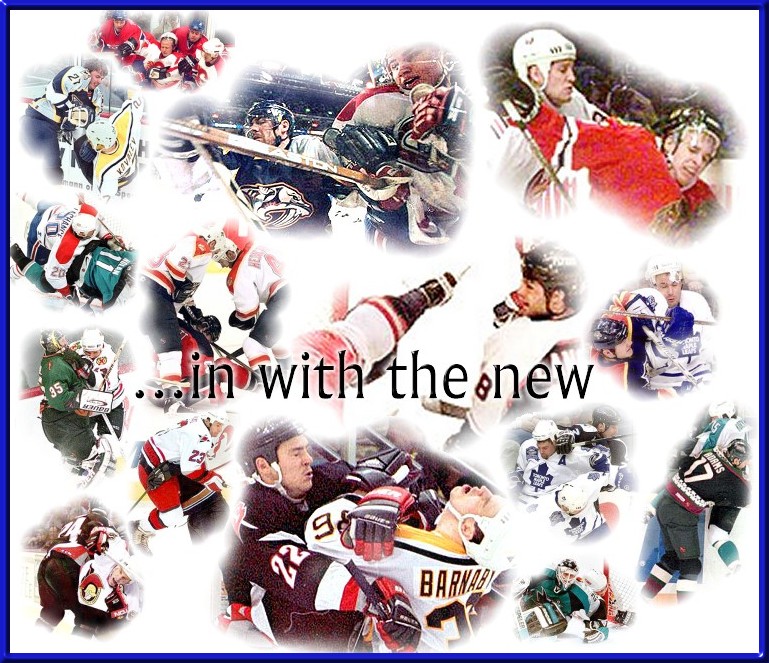


The two
digital collages created represent the changing trends in the sport of hockey:
from a game that had class and dignity, to a sport that has become increasingly
bloody. The game of Canadian hockey that was represented by great plays,
sportsmanship-developing rituals, and great athletes such as Mario Lemieux,
Mark Messier, and especially Wayne Gretzky, is changing into a game dominated
by hard hits, devastating collisions, and incidences that could've escalated
to something truly horrific.
When we see a popular
sport like hockey in North America turning into a sport with more physical contact
and less hockey, we fathom of what this symbolizes. Sport is a microcosm
of the society that we live in, so when hockey turns more and more into boxing
matches, sumowrestling, and crimescenes, it can only mean that the society will
change into a place of crime and violence as well -- if it hasn't already.
The majority of
the first collage consisted of the Great One, Wayne Gretzky. This is because
his recent retirement from the game signifies the end of an era -- the era of
finesse and grace in the game of Canadian Hockey. A winner of multiple
Lady Byng awards, which are given to a player that has shown sportsmanlike conduct
in a season, Wayne Gretzky, without a doubt, is the classiest player ever to
hold a hockey stick and strap on a pair of skates.
Going head first
into the wall (top-right), nearly losing your eyes to the blades of someone's
skate (middle), having your head crammed between the goal post and the goalie's
shoulder (bottom-right), being taken down from behind (midde-left), getting
kneed in the stomach (bottom-left), running into the goalie (above the previous
picture), are only few of the examples in the collage that hints the fact that
hockey is violent game, and it will only get worse if it is allowed to continue
in the fashion that is has been for the last ten years. Even the fact
that there are more pictures in the second collage than the first hints at the
violence in hockey, because pictures are published because people want to see
them, if there are more pictures that deal with violence, it means more people
want to see big hits, and dangerous situations rather than great goals and great
plays.
Predictably, hockey
isn't the only spot that's turning into a violent sport: baseball, football,
and basketball are only a few of the many sports that contain an increasing
amount of violence: bench brawls, career ending collisions, team riots, it's
only a matter of time before an Andre Agassi jumps over the net and assaults
his opponent with his tennis racquet.
So the question
pops up: So what are we going to do about this? The answer is by no means
a simple task to derive, for how do you stop violence? If you disallow
it, it will only show up in another place, if you punish it, depending on the
severity of the punishment, it will only be shrugged off...so what do you do...
The first, simplest,
and most logical step that should be taken, is to harshen the reprocussions
on violence. If a player is injured for a certain amount of time, the
player responsible for that injury won't be playing for the same amount of time
the injured player is out -- no matter if the injury was intention or accidental.
This however, will not completely irradicate violence from sports, for in the
audience demands it, there will also be room for a supplier: there needs to
be change in the attitudes of the fans, they need to realize that violence,
no matter where it takes place, cannot be encouraged. They need to realize
that the person that is injured is a human being, a family member, a loved one
-- if you wouldn't cheer to see your loved one getting cross-checked, you shouldn't
cheer to see someone else's loved one sustain the same type of injury as well.
Unfortunately, the latter is much more difficult to implement than the former,
for all the sources in our society that influence the people, must change as
well: the media, parents, friends, teachers, role models, a drastic change in
the way our society is seen will occur if the change in people's attitudes will
change. Some might argue that why try implement change if the chances
of change is next to impossible, my answer is that I would rather option for
a chance to prevent violence than to allow it to run rampant in our sport and
let it leak out into our society.